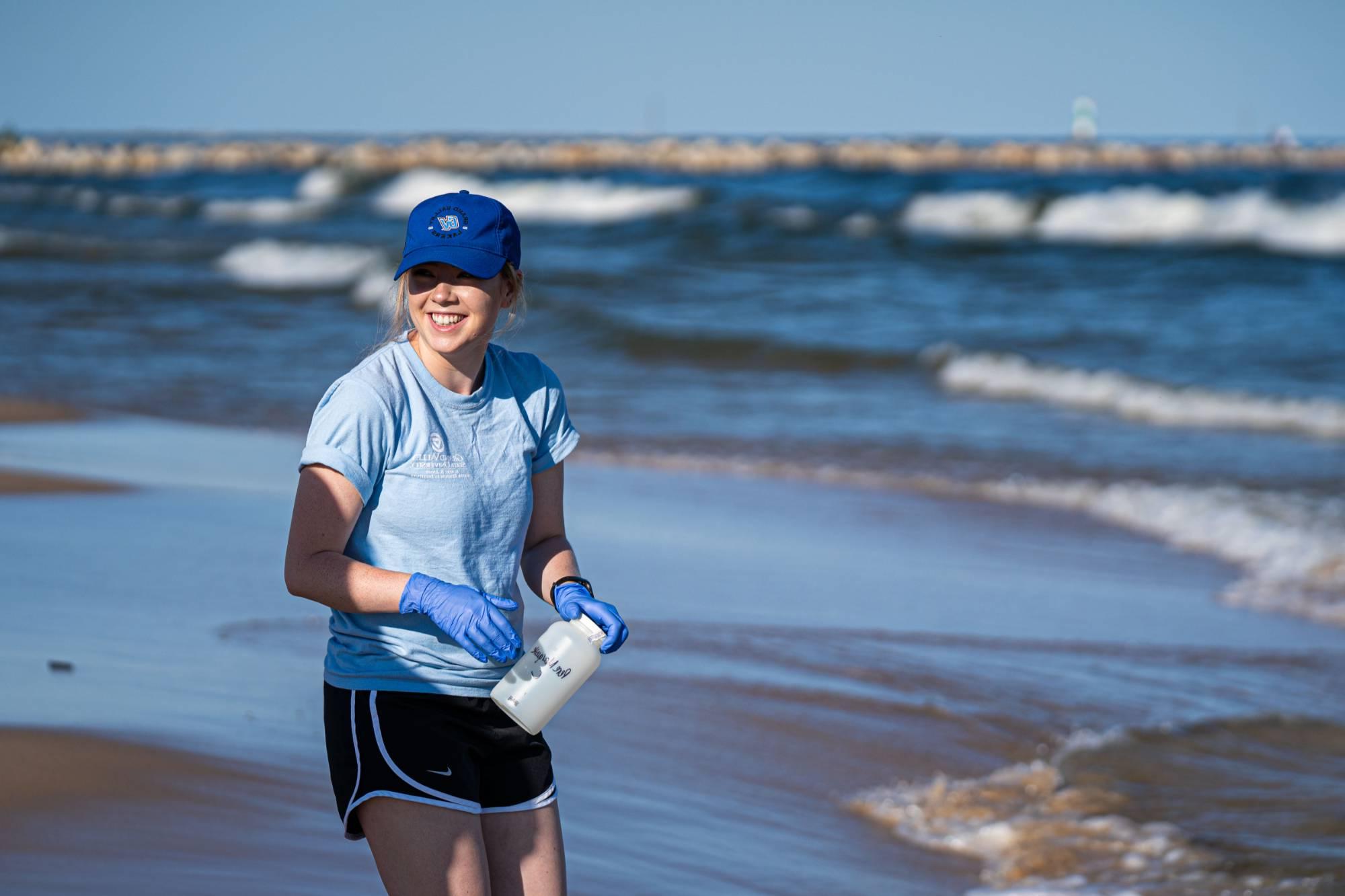Robert B. Annis Water Resources Institute
How do you embrace the idea that water is rapidly becoming a scarce world resource when you live near the Great Lakes that stretch to the horizon? When water flows liberally from the tap, and you enjoy a seemingly endless supply of rivers and inland lakes? This is the Michigan we know and love. It’s easy to get complacent and take water for granted.
The Need is Urgent
Trust us…our West Michigan waters, while abundant, are not immune from danger. New or growing threats include:
- Microplastics: 11 million pounds of plastics are dumped annually into Lake Michigan, also affecting adjacent lakes.
- Harmful Algal Blooms (HABs): Warmer water temperatures and excess nutrients are growing this threat for inland lakes and our Great Lakes.
- Salinization of Water Resources: Salt run-off from road de-icer application is creating toxic environments in our lakes, groundwater, and streams.
- Groundwater Sustainability: Natural and man-made contaminants such as PFAS, and increased withdrawals of groundwater for development and agriculture, threaten both the quality and quantity of groundwater.
- SARS CoV-2 Wastewater Monitoring: The CDC has recommended wastewater testing for monitoring infection levels. The State of Michigan has invested in the infrastructure for these analyses at 19 public health and university sites, including AWRI.
- Pathogens at Great Lakes Beaches and Tributaries: Beach closings around the Great Lakes are increasingly common, requiring testing and tracking for same day test results to protect both animals and humans.
- Population-Driven Stressors: West Michigan is on the list of projected ‘climate sanctuaries’ which may drive an increase in both new residents and visitors. Good for the economy. Tough on the lakes.
- Climate Change: Climate change directly affects freshwater resources due to related changes in land use, biodiversity, and coastal resiliency.



What We Do
Grand Valley’s Robert B. Annis Water Resources Institute (AWRI) was created 35 years ago and was the first freshwater research, outreach, and educational organization working in West Michigan, for West Michigan. Its work is firmly focused on the future, at the intersection of our region’s economic and environmental vitality.
Ecological Research

Nearly 70 staff members, including 10 research scientists and dozens of graduate and undergraduate student researchers, conduct groundbreaking research in areas such as microbial ecology, aquatic ecology, phycology, molecular ecology, ecological modeling, fisheries ecology, changing climate, aquatic ecosystem restoration, invasive species, watershed hydrology and geospatial analytics, and environmental chemistry and toxicology.
Education and Outreach

More than 185,000 students and community members have participated in a hands-on experience through AWRI’s Water Resources Education Program which utilizes two research and education vessels, the D.J. Angus, berthed in Grand Haven, and the W.G. Jackson, berthed in Muskegon.
Educators, policy makers and citizens are reached through various educational events and activities such as professional development workshops for educators (Project WET, GLOBE, Project Learning Tree, Population Education) as well as public events including water festivals, community events, and Making Lake Michigan Great tours.
Student Opportunity
Maggie Peterson
““I worked on projects I never would have had the chance to experience otherwise, and learn from phenomenal mentors like Dr. Charlyn Partridge. The networking opportunities created at AWRI have been tremendously helpful in my career.”
–Maggie Peterson '22
M.S. Biology with Aquatic Focus
Researcher, Great Lakes Environmental Center
Ellen Foley
“I felt that AWRI provided an unparalleled opportunity to pursue my interests in freshwater resources. The institute not only embraces but encourages the interdisciplinary nature of aquatic science through collaboration, dissemination of research, and community engagement.”
–Ellen Foley '22
Development Associate, Leeward Renewable Energy
Former Graduate Student Researcher
Research Impact
AWRI's work helps Muskegon Lake reach pivotal milestone
“AWRI has been proudly involved in the Muskegon Lake AOC for over 25 years providing scientific and monitoring expertise," said Al Steinman, AWRI's former director.
AWRI-operated drones to clean up plastic on beaches and waterways
“This not only impacts Great Lakes wildlife, but also the 40 million Americans and Canadians that require the Great Lakes for their drinking water," said Lora Shrake. "Once collected, the litter is analyzed providing valuable data that allows us to understand the scale of the problem.”
GVSU research helps find possible link in oxygenation of young Earth
“This work is a great example of how a careful study of a small piece of our natural world can reveal so much about the workings of the entire natural world,” said Bopi Biddanda, professor of water resources at Grand Valley.
How You Can Help
Our mission is to ensure the future of our lakes, rivers, and wetlands for our families and communities long into the future. To do this, we need your help which will:
- Leverage AWRI’s expertise as the region’s most established freshwater expert and community partner, to remain proactive and relevant in the face of new and growing threats.
- Expand our ability to attract and retain top freshwater scientists.
- Expand our capacity to train student researchers who will be our next generation of scientists.
- Increase our education and outreach efforts to ensure community-wide understanding of freshwater issues and preventative measures.
Current funding alone cannot sustain the increasingly complex work that needs to be done over the next decades. We are reliant on donor support to create the margin of excellence that will sustain the institute's work for generations.
We all have a stake in saving our shores. Please support AWRI today.
Contact
University Development
(616) 331-6000
[email protected]



[1671116924].jpg)


